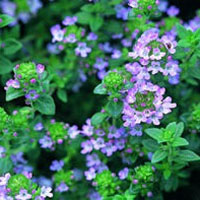Gluten Free
What does following a gluten-free diet mean? That you're embarking on an easy diet with a wide range of health-promoting effects. Instead of dwelling on what you’re giving up, consider that you’re going to enjoy a whole new world of delicious food options to meet your special dietary needs. You’ll be eating seasonally, choosing more fresh fruits and vegetables, focusing on meats, seafood, poultry, legumes, lentils, corn, and rice, and discovering fascinating ancient grains such as quinoa, amaranth, and millet. You’ll be able to eat potatoes, eggs, most cheeses, even chocolate (!)—and enjoy them without guilt because you’ll be taking good care of your body. In fact, you’ll probably end up eating—and feeling—better than ever!
Visit this page for more information about living Gluten Free
---
We carry a large variety of gluten free items, the brands listed below represent just some of the offerings we carry















More Diets
Thyme
 © Martin Wall
© Martin WallParts Used & Where Grown
This fragrant plant is indigenous to the Mediterranean region of Europe and is extensively cultivated in the United States. The dried or partially dried leaves and flowering tops are used medicinally.
- Reliable and relatively consistent scientific data showing a substantial health benefit.
- Contradictory, insufficient, or preliminary studies suggesting a health benefit or minimal health benefit.
- For an herb, supported by traditional use but minimal or no scientific evidence. For a supplement, little scientific support.
Our proprietary “Star-Rating” system was developed to help you easily understand the amount of scientific support behind each supplement in relation to a specific health condition. While there is no way to predict whether a vitamin, mineral, or herb will successfully treat or prevent associated health conditions, our unique ratings tell you how well these supplements are understood by the medical community, and whether studies have found them to be effective for other people.
For over a decade, our team has combed through thousands of research articles published in reputable journals. To help you make educated decisions, and to better understand controversial or confusing supplements, our medical experts have digested the science into these three easy-to-follow ratings. We hope this provides you with a helpful resource to make informed decisions towards your health and well-being.
This supplement has been used in connection with the following health conditions:
| Used for | Amount | Why |
|---|---|---|
Bronchitis | Refer to label instructions | Thyme has antispasmodic, mucus-clearing, and antibacterial actions. |
Chronic Candidiasis | Refer to label instructions | Volatile oils from thyme have been shown to have significant antifungal action. Doctors recommend enteric-coated capsules, which break down in the intestines instead of the stomach. |
Cough | Refer to label instructions | Many constituents in thyme team up to provide its antispasmodic, mucus-expelling, and cough-preventing actions. It also appears to be safe even for small children. |
Halitosis | Refer to label instructions | Volatile oils made from thyme have antibacterial properties and may be effective in mouthwash or toothpaste form. |
Head Lice (Paw Paw, Tea Tree Oil) | Apply shampoo to hair and leave on for one hour before washing out | An herbal shampoo containing a standardized extract of paw paw, thyme oil, and tea tree oil has been found to be effective in treating head lice. |
Indigestion, Heartburn, and Low Stomach Acidity | Refer to label instructions | Thyme is a gas-relieving herb that may be helpful in calming an upset stomach. |
Infection | Refer to label instructions | Thyme is an herb that directly attack microbes. |
Whooping Cough | Refer to label instructions | Many constituents in thyme team up to provide its antispasmodic, mucus-expelling, and cough-preventing actions. It also appears to be safe even for small children. |
Traditional Use (May Not Be Supported by Scientific Studies)
Other than its use as a spice, thyme has a long history of use in Europe for the treatment of dry, spasmodic coughs as well as bronchitis.1 Its antispasmodic actions have made it a common traditional recommendation for whooping cough. Thyme has also been used to ease an irritated gastrointestinal tract. The oil has been used to treat topical fungal infections and is also used in toothpastes to prevent gingivitis.
Copyright © 2025 TraceGains, Inc. All rights reserved.
Learn more about TraceGains, the company.
The information presented by TraceGains is for informational purposes only. It is based on scientific studies (human, animal, or in vitro), clinical experience, or traditional usage as cited in each article. The results reported may not necessarily occur in all individuals. Self-treatment is not recommended for life-threatening conditions that require medical treatment under a doctor's care. For many of the conditions discussed, treatment with prescription or over the counter medication is also available. Consult your doctor, practitioner, and/or pharmacist for any health problem and before using any supplements or before making any changes in prescribed medications. Information expires December 2025.











